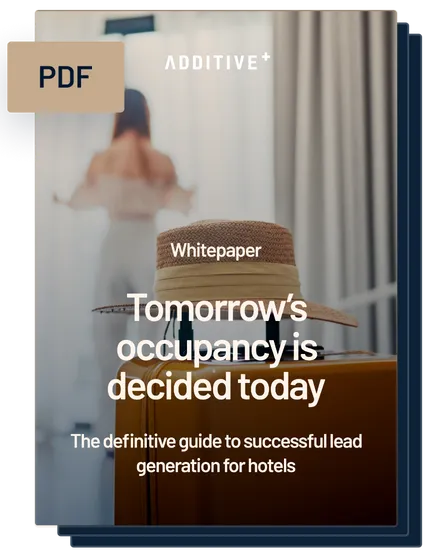
SEA vs. SEO: How Hotels Can Profit from Both Approaches

Leverage the advantages of both SEA and SEO for maximum success: In this expert article, you will learn how your hotel can increase its online visibility and generate direct bookings by combining search engine advertising and search engine optimization.
SEO vs. SEA
Hotels face the constant challenge of maintaining and increasing their visibility on the internet in order to stand out from the competition. A good ranking in the search results is crucial in order to continuously attract new guests and sustainably increase the number of direct bookings.
Two essential online marketing strategies that help hotels achieve these goals are Search Engine Optimization (SEO) and Search Engine Advertising (SEA). However, the question often arises for hotels as to which of the two measures should be emphasized more, or whether both measures are really important.
This article provides an overview of what exactly is meant by SEO and SEA and how hotels can implement these measures profitably in their own business.
SEO and SEA Explained: An Overview
Both SEA and SEO are part of search engine marketing. Both strategies aim to increase the digital visibility of a hotel and thus increase traffic to its own website or landing pages in a targeted manner.The common basis of both measures is what is known as “keyword research”.
This involves identifying search terms that are relevant to the hotel and that your target group might use in their online searches. The identified keywords are therefore an important cornerstone for all further SEO and SEA measures.
Search Engine Optimization (SEO)
SEO includes all strategies that are used to optimize the website for ranking in organic, i.e. unpaid search results. An important measure in this context is the optimization of content on your own website: Among other things, relevant keywords should be incorporated into text passages, headings and image descriptions. It is particularly important to keep an eye on the added value for the reader and the quality of the content and not to overfill the text unnecessarily with keywords in order to avoid so-called “keyword stuffing”, thus the excessive use of keywords in texts. The more relevant and high-quality the website content is for the respective target group, the better the ranking in the search results will be.
Clear navigation and user-friendliness on the proper website, as well as a good loading speed also have a positive effect on the ranking in organic search results.
These targeted optimization measures help search engines to better understand and classify your website. Ultimately, however, it is always about improving the website for the respective users: Targeted optimizations offer real added value and thus have a positive effect on the ranking in organic search results.
Other measures such as collecting positive reviews on platforms such as Google My Business and an active social media presence also have a positive effect on increasing traffic to the hotel’s own website.
Social SEO:
- In addition to traditional search engines such as Google or Bing, social media platforms, such as Facebook, Instagram or TikTok are now increasingly being used to search for specific content. “Social Media SEO” is therefore becoming increasingly important and should definitely be included in the proper social media marketing strategy: Targeted measures such as the optimization of descriptions and hashtags with relevant keywords help hotels to position themselves successfully in the corresponding search results in social networks.
The targeted optimization of social media channels and published articles and postings, as well as the active use of the accounts, help hotels to achieve a higher reach in social networks and can in turn lead to more traffic to the own website through targeted links.
In our current article “Social Media Trends 2024: Half-Year Summary” we look at the most important points that hotels should consider in their social media marketing in 2024.
Search Engine Advertising (SEA)
SEA refers to paid advertisements in search engines such as Google or Bing. This mainly involves so-called pay-per-click (PPC) ads or paid ads.
Suitable search results are displayed to people who have searched for specific search terms or keywords. This allows hotels to respond very specifically to relevant search queries and position their ads successfully in the search results. Furthermore, campaigns can be targeted to the respective target group according to demographic data or user behavior, for example.
The decision on the placement of the ads placed is mainly determined by the following elements:
- The bid amount: The amount that hotels are willing to pay per click on the ad. Of course, the amount depends heavily on the respective advertising budget.
- The quality factor: This takes into account the quality of the ad, how well the respective ad and the linked target page (landing page) match the search query or keyword, but also the positive user experience on the target page itself.
The Importance of Both Marketing strategies for the Hotel Industry: a Targeted Combination for Maximum Success
Both SEA and SEO aim to increase the own visibility in search engines and bring users to the own website or landing page. This results in more direct bookings and therefore more revenue for the proper hotel.
Search Engine Optimization (SEO)
- Although search engine optimization does not incur any direct costs for advertisements, it does require a long-term investment in the form of time and employee resources for the implementation and optimization of the individual measures. The results that are achieved only become apparent after some time and ongoing optimization measures. However, the increased visibility achieved with search engine optimization has a sustainable and long-term effect.
Organic search results also generally enjoy a higher level of trust among users, and the implemented measures and ongoing optimizations do not entail any additional marketing costs beyond the working time required for the respective measures.
In the best-case scenario, constant optimization will result in lasting visibility and relevance for the target group, and thus enable a steady influx of visitors to the own website.
Search Engine Advertising (SEA)
- In contrast to SEO, SEA incurs direct costs for the ads placed. As the ads appear immediately in the respective search results, depending on the bid level and quality factor, paid search engine marketing ideally delivers immediate visibility with direct results in the form of traffic, bookings and inquiries. Ads can be tailored even more specifically to the respective target group as part of so-called “targeting”, for example by targeting users in certain geographical regions or with specific interests. Since the bid amount can be decided itself, the result is a flexible control of the own advertising budget. In addition, ongoing campaigns can be evaluated and optimized by targeted analyses in real time to further increase the efficiency of the advertising measures.
While SEO brings sustainable visibility and trust among users, SEA offers fast results and flexible budget control. The targeted combination of both measures can therefore help hotels achieve maximum success in terms of digital visibility.
What Does Search Engine Marketing Look Like in Practice?
While the constant optimization of the website for long-term visibility should be specifically addressed by hotels, periods with lower utilization can be bridged or cushioned by target group-oriented search engine advertising.
But what does the implementation of the two strategies look like in practice?
SEO:
- Identify particularly relevant search terms that fit well with your hotel and that (potential) guests can use in their search queries. There are numerous tools that support hotels in analyzing relevant search terms and their performance.
- Provide high-quality content on your website: This includes, for example, well-structured text passages with relevant keywords and high-quality multimedia files. Also pay attention to user-friendliness in the navigation and a good loading speed.
- In addition, so-called “meta-tags” of a website can be optimized: These are elements that provide information about the content of a website.
"Title-tags" for example, define the title of a website that is displayed in the search results. It is important to include relevant keywords here too.
The "meta description tag" on the other hand, contains a summary of the content of the page. As it also appears in the search results, an exciting and relevant text can lead to a significantly higher click-through rate.
SEA:
- Here, too, the identification of relevant search terms plays a decisive role.
- This is followed by the conception of the individual advertisements or campaigns: Ads are tailored to the target group in terms of keywords, geographical data, interests or other factors. The advertising budget is then set for each campaign or keyword and the ads are placed.
- Choosing the right landing page: In order to benefit as much as possible from paid ads, hotels should rely on conversion-optimized landing pages in digital marketing. These provide an overview of all relevant highlights of the hotel, answer the most important questions, and guide potential guests to an inquiry or booking.
Targeted Monitoring:
- Both SEO and SEA measures require closing monitoring of the measures taken in order to check whether the individual efforts have achieved the desired results, such as increased visibility, more traffic and more direct bookings. The strategic monitoring of the performance and success of marketing activities allows for a targeted adjustment of strategies in all areas in order to benefit as a hotel in the best possible way.
Conclusion: Targeted Use of Synergies
The points above show why a holistic search engine marketing strategy is so important for hotels. Both SEO and SEA offer unique advantages and complement each other perfectly when it comes to maximizing online presence and increasing direct bookings.
While SEO ensures sustainable visibility, SEA can lead to increased findability on the internet in the short term and, above all, in a timely manner. It is therefore essential for hotels to incorporate both measures into their own online hotel marketing. This is the only way to maximize the benefits of both strategies for the own business success.
Choosing a specialized partner can help hotels to implement both strategies efficiently and profitably as part of their own marketing strategy.







.jpg)

.jpg)



.webp)
